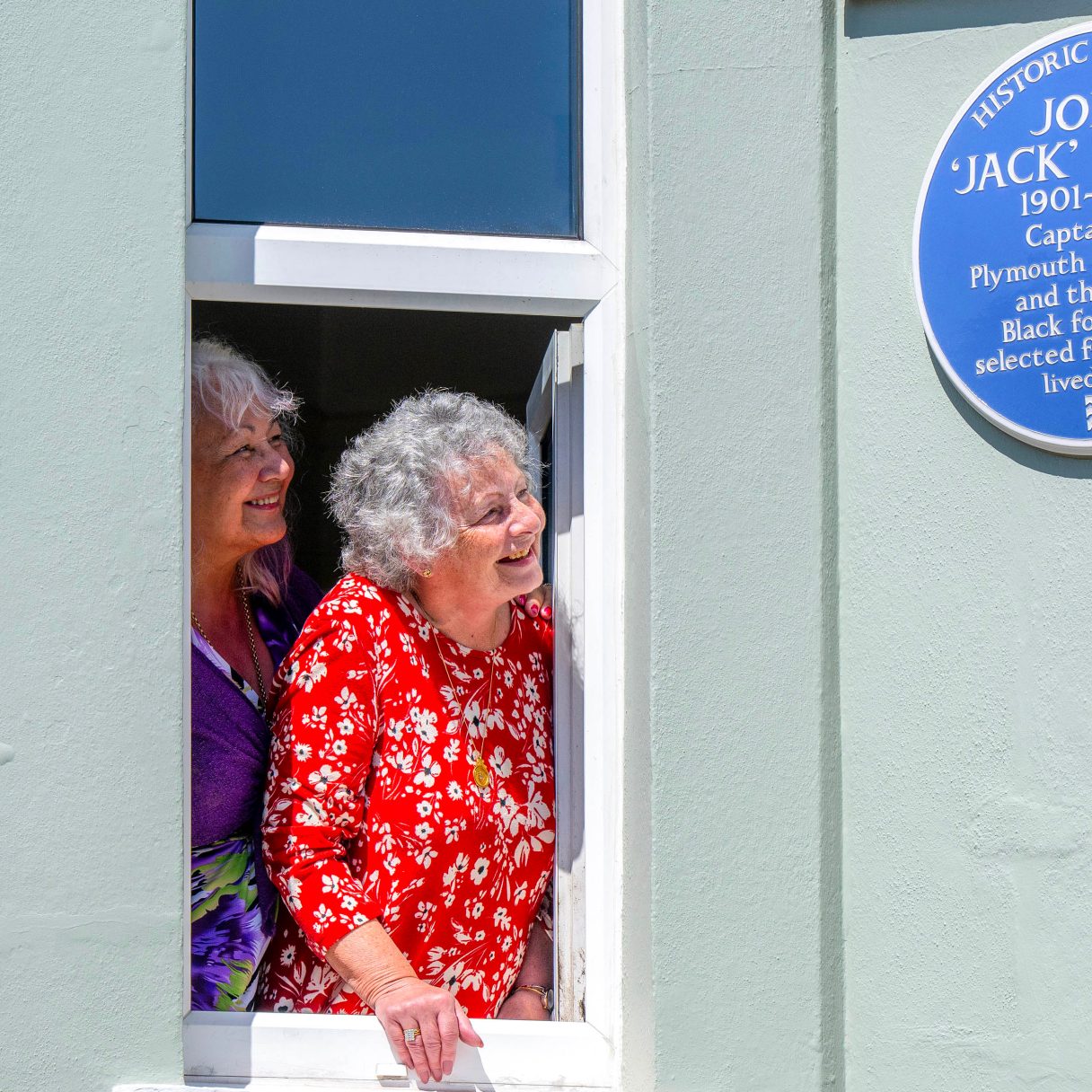
National Blue Plaque honours first Black footballer to Captain a league team and receive call up for England
• Today Historic England unveils a national blue plaque celebrating the life and achievements of talented footballer John ‘Jack’ Leslie (1901-1988) at 8 Glendower Road, Plymouth, where he lived with his wife and daughter at the peak of his footballing career
• Leslie was the first Black captain of an English Football League team, Plymouth Argyle FC
• 2025 is the 100th anniversary year since Leslie was the first Black footballer to be ‘called up’ as a reserve for the England team in October 1925. Leslie was denied this opportunity as the honour was rescinded shortly afterwards, thought to be due to the racial prejudices of the time. Nevertheless, this achievement merits acknowledgement as a recognition of Leslie’s talent and as a poignant moment in football history
• The national blue plaque will be unveiled by Historic England’s Chief Executive Duncan Wilson, and Jack Leslie’s granddaughters Lesley Hiscott, Gillian Carter and Lyn Davies.
• Historic England’s national blue plaque scheme highlights the stories of inspirational people from all walks of life who have made a significant contribution to human welfare or happiness, some famous and some whose history has been hidden or forgotten
• The unveiling marks the start of the eight-week public nomination period for the National Blue Plaques Scheme, from 16 May to 10 July 2025. The public is invited to submit their own nominations for people they would most like to see recognised through a prestigious Historic England national blue plaque at https://historicengland.org.uk/listing/national-blue-plaque-scheme/
• The National Blue Plaque Scheme is generously supported by Delancey and The Earls Court Development Company.
Today (16 May 2025) Historic England unveils a national blue plaque in Plymouth to honour the life and groundbreaking career of John ‘Jack’ Leslie, the first Black footballer to captain a Football League team. This unveiling marks Leslie’s footballing talent and celebrates the 100th anniversary year of his call-up as a reserve for the England squad in October 1925. Though this honour was rescinded shortly afterwards, it is thought on the grounds of racial prejudice, Leslie’s resilience in continuing to excel at Plymouth Argyle FC and his significance in the history of English football has more recently been acknowledged and celebrated.
The new blue plaque will be unveiled at 8 Glendower Road, Peverell, Plymouth, Devon, PL3 4LA, where he lived with his family during the heyday of his career, captaining Plymouth Argyle FC.
Leslie possessed remarkable skills as a striker which brought him a tally of 137 goals in a total of 401 appearances for the club during his career.
The inscription on the plaque reads: JOHN ‘JACK’ LESLIE /1901 – 1988 / Captain of / Plymouth Argyle FC / and the first / Black footballer / selected for England / lived here.
The unveiling will be led by Historic England’s Chief Executive Duncan Wilson, alongside Jack Leslie’s granddaughters Lesley Hiscott, Gillian Carter and Lyn Davies.
The unveiling marks the start of the eight-week public nomination period for the National Blue Plaques Scheme, from 16 May to 10 July 2025. The public is invited to submit their own nominations for people they would most like to see recognised through a prestigious Historic England national blue plaque at www.historicengland.org.uk
Leslie – the first Black player to be called up for an England match
On 6 October 1925, Leslie was informed by his manager that he had been selected for England by the Football Association (FA). The list of the England squad to play the forthcoming international against Ireland was published in the newspapers and Leslie was named as one of the two reserves.
As Leslie recalled later, “Everybody in the club knew about it. The town was full of it. All them days ago it was quite a thing for a little club like Plymouth to have a man called up for England. I was proud – but then I was proud just to be a paid footballer”* (Tiller, p.130).
Elation turned to disappointment when the England selectors replaced him as a reserve three days before the match. Leslie is quoted as saying “the FA had come to have another look at me. Not at my football but at my face … No one ever told me official-like, but that had to be the reason, me Mum was English but me Dad was black as the Ace of Spades. There wasn’t any other reason for taking my cap away” * (Tiller, p.135).
Despite this blow, Leslie resiliently focused on his career at Plymouth Argyle FC and on the same afternoon that England drew 0-0 with Ireland, he scored two goals in Argyle’s 7-2 win against Bournemouth, contributing to the club’s record-breaking tally of 107 league goals for the season.
In the history of Black players in English football, Leslie was preceded by pioneering footballers such as Arthur Wharton, Walter Tull and Fred Corbett who had played for league teams before the First World War. Among his contemporaries was Eddie Parris, who won a cap for Wales in 1931. Following Leslie’s call up in 1925, another 53 years passed before Viv Anderson became the first Black player to play for England in 1978.
The Football Association (FA) has since presented Leslie with a posthumous cap (in October 2022) and recognised that retraction of his call-up “should never have happened”. The FA stated that “he faced adversity because of the colour of his skin, and was deselected and never played for his country” and that the posthumous cap recognised Leslie’s “career, his contribution to our game and wider society, and to right this historical wrong” .
Leslie’s Life and Achievements
Leslie was an inspirational footballer who achieved great success playing for Plymouth Argyle FC from 1921 until 1935. He developed a strong partnership with fellow player Sammy Black, which was instrumental in propelling Plymouth Argyle towards its highest-ever standing in the English Football League. In 1932 he led Plymouth Argyle to the fourth spot in the Second Division – a record that has never been equalled.
On 10 March 1928, Leslie was given the captain’s armband in an away match against Norwich. This was a significant moment in football history, for Leslie was the first Black player to captain an English Football League team.
He rarely missed a game and was joint top scorer in the 1928-29 season with 22 goals.
Leslie’s final two seasons as a professional footballer were overshadowed by an injury to his eye which forced him to miss much of the 1933-34 season. He struggled to regain his old form and played his final match in April 1935.
Life after Leslie’s professional football career
Soon after his retirement from football, Leslie took on the tenancy of the Swan Inn in Truro, Cornwall which he ran until 1938. Later that year, Leslie and his family moved to East London. Leslie worked as a boilermaker, riveter and plater in the East India Docks until his retirement in 1966. At the suggestion of his daughter Evelyn, Leslie then found a part-time job cleaning boots and sweeping terraces at West Ham United’s stadium Upton Park, near his home in East Ham. In 1978, Leslie was interviewed by the Daily Mail and reflected on his career and the racism he encountered. In October 1982, he was honoured with a brief ceremony before the match at Upton Park to mark his retirement from the West Ham boot room.
Leslie and Plymouth
Jack Leslie was regarded as a hero in Plymouth and he later said that “It was a good move for me. Argyle treated me well, and I had a great respect for the club’s supporters. I found Plymouthians a fine bunch of people and I still have a warm regard for the place”* (Tiller, p. 81). His association with the city spanned 14 years and he often spent his time off playing bowls on Plymouth Hoe or socialising with his fellow team-mate, Fred Titmuss.
Today, both the city and the club remain hugely proud of Jack Leslie, as evidenced by the fact that The Jack Leslie Campaign (a crowdfunded campaign) succeeded in raising £140,000 to erect a bronze statue to him outside Plymouth Argyle’s Home Park stadium in October 2022. The new national blue plaque amplifies this proud legacy and aims to inspire people to find out more about Leslie’s achievements.
The national blue plaque scheme, run by Historic England on behalf of the Department for Culture, Media and Sport (DCMS) tells the stories of inspirational people – from all walks of life – who have made a significant contribution to human welfare or happiness, throughout history.
Some plaques commemorate famous people – like Hollywood actor Cary Grant or music icon George Harrison – while others honour those that aren’t widely known but should be, such as Daphne Steele, the first Black matron in the NHS, Clarice Cliff, a pioneering ceramicist and factory art director , and now also Jack Leslie.
Jack Leslie’s granddaughters Lesley Hiscott, Gillian Carter and Lyn Davies said: “We feel honoured as members of Jack Leslie’s family that a blue plaque is being unveiled in recognition of his achievements. Our Grandad made a major contribution to the history of not only football but the integration of black people into our communities. He was a true trailblazer, and we will always be immensely proud of him.”
Duncan Wilson, Chief Executive, Historic England said: “It is an honour for Historic England to unveil a national blue plaque to pioneering footballer Jack Leslie at his former home in Plymouth, just a short distance away from where he played at Plymouth Argyle FC’s Home Park. Leslie’s story is not only about football; it is a testament to his resilience in the face of racism . The first Black footballer called up to the England squad, Leslie’s call-up was rescinded, which seemed to be due to the racial prejudices of the time. While he never played for his country, Leslie’s story serves as an inspiration for current generations, to continue to challenge racial boundaries in sport. We hope this blue plaque helps celebrate his achievements and inspires future generations “
Heritage Minister Baroness Twycross said: “Jack Leslie’s blue plaque celebrates his life and inspirational achievements during his career as a talented footballer.
“Marking the 100th anniversary since Leslie became the first Black captain of an English league team, this plaque will serve as a reminder of this significant moment in the history of football and his remarkable talent, resilience and contribution to the game.”
Plymouth City Council’s Deputy Leader, Councillor Jemima Laing said: “Today marks an important moment in celebrating Plymouth’s rich local history and the remarkable achievements of Jack Leslie. His legacy goes far beyond the football pitch and it’s wonderful to see him getting the recognition he was once denied but certainly deserves. Today’s plaque unveiling will help ensure his story and the important conversations we need to have about inclusion and equality in sport are remembered, not just now but for many years to come.”
Paul Elliott CBE, former professional footballer and co-founder of Kick It Out, said: “Jack Leslie was a true trailblazer of our game – a player of outstanding talent who broke down barriers and helped shape the history of English football. This blue plaque not only honours his achievements on the pitch but also recognises his wider contribution to society and tackling discrimination off it. It stands as a powerful symbol of progress and ensures that Jack Leslie’s remarkable story will continue to inspire future generations to come.”
Staff at The Jack Leslie Campaign, The Box, Plymouth and the Hidden Figures of Plymouth 2023-2025 project (a two-year National Lottery Heritage Fund project to highlight the unsung heroes of the city’s history), supported the research of Jack Leslie’s life, which enabled the installation of this plaque.
Matt Tiller and Greg Foxsmith, co-founders of the Jack Leslie Campaign said: “100 years ago Plymouth Argyle’s Jack Leslie was a young newlywed with the world at his feet. He walked from this house to Home Park where he was given the fantastic news that is so significant in the history of our national sport. Jack had been picked for England, the first player of colour to be selected.
“He returned to Glendower Road to share that achievement with his new wife, Win. And it was here that he would later have to deal with that dream being snatched away. But he bounced back helping Argyle win promotion and becoming team captain. It also became a family home after his daughter Evelyn came along in 1927. It is a wonderful moment to see Jack recognised and celebrated here with a blue plaque.”
Slain McGough Davey, Founder/Supervisor of Hidden Figures of Plymouth and Artistic Director of WonderZoo, said: “Jack Leslie was the first black football player picked to play for England in 1925 due to being the number one goal scorer in English Football at the time. However, due to the colour of his skin, he was sadly denied his place on the team and was soon dropped after selection. Retiring from professional football in 1935, he continued to work as a member of the backroom staff for West Ham United and he cleaned boots for the likes of Bobby Moore, Harry Redknapp and Trevor Brooking.
The injustices against this underappreciated but loved Plymouth-based football player, has seen different organisations come together to fight for his name to be remembered. Those efforts resulted in a statue being placed at Plymouth Argyle’s Football Ground in 2022, and then in 2023 the Football Association presented a cap to Jack’s family to recognise the adversity he faced in the 1920s because of racial discrimination.
Now, in the honour of restoring justice towards an event that should have been prevented, it is a proud achievement for Leslie to receive a Blue Plaque from Historic England. This much-needed recognition provides justice, pride and admiration.”
Funding Acknowledgement
We give special thanks to Delancey and The Earls Court Development Company for their generous support of Historic England’s national blue plaque scheme.





